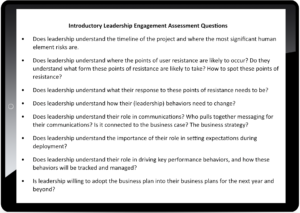
“Leadership engagement is complex, has many moving parts, and involves more than just the current project.”
We talk a lot about how leadership must be engaged for change to occur, but such engagement happens less than we would like or need. Why is that you might ask?
Maybe….
- it is because leadership’s value in the change process hasn’t been tied to measures of success
- these measures don’t exist
- they don’t understand their role and what they are accountable for in managing change.
- they don’t understand the impact / value of their role on the project
- they don’t understand the value of the project to the organization
- they don’t understand the impact of the change on their people
- they don’t understand OCM
- they don’t have the time (real or perceived) and they don’t see it as a priority
Wow! That’s a lot of “Maybes”.
How can we reduce this list a bit and target potential fixes to increase leadership’s engagement in the change process?
Answering the following questions can provide a good start.

So now what? While you may now better understand some of the underlying causes of leadership’s lack of engagement and the questions to ask to assess engagement , how do we increase engagement and ensure sustainable change among leadership? Let’s look at some of the more common solutions.
Ensure that any external consultant you hire is fully committed to educating and engaging leaders in every phase of the project.
- Ensure that key documents are developed to serve multiple audiences and provide both project management and leadership with an early warning system that identifies points of resistance, go/no-go progress, and risks.
- During the consultant selection process, ask the external consultants specifically how they engage and educate leadership.
Treat leadership as a partner rather than a customer.
- Ensure the project team involves leadership in the development of the OCM measures of success.
- Involve leadership in a transparent and active governance process that includes a multi-step go/no-go sign off process.
- Ensure communication with leadership that includes a discussion of risk.
- As part of the consultant selection process, ensure that external consultants have a track record of “straight talk” to leadership.
- Ensure governance meetings are short, have repeatable agendas, and, most importantly, include transparent discussions and recommendations.
- Define specific and measurable roles and responsibilities for leadership in managing change. Ensure these roles and responsibilities are updated as the project matures.
Understand the timing and ranking of leadership’s competing priorities.
- Develop a leadership calendar to ensure the team understands the priorities and the availability of each leader.
- Involve leadership in the process to ensure their initiatives are integrated at the “desk level”.
Resist the urge to provide leadership with mere talking points as the fulfillment of their communication responsibilities.
- Prepare leadership with context to understand the impacts and timing of the changes to their teams.
I hope that this blog serves as a practical guide in how to ensure the active engagement of leadership throughout the change process.
Leadership engagement is complex, has many moving parts, and involves more than just the current project.
And while we can use tools (like the ones outlined here) to guide us, they are simply tools. They help us combine our experience with an understanding of the specifics of your organization’s changes. They define and focus our efforts. In addition, external consultants have limitations that require them to uniquely partner with internal resources e.g., Corporate Communications, HR, leadership, and internal change resources to name a few.
We would like to talk with you about how we’ve enabled organizations and leadership to create effective and sustainable change. Please call us or send an email to marketing@thecaragroup.com. We’d love to hear from you.



